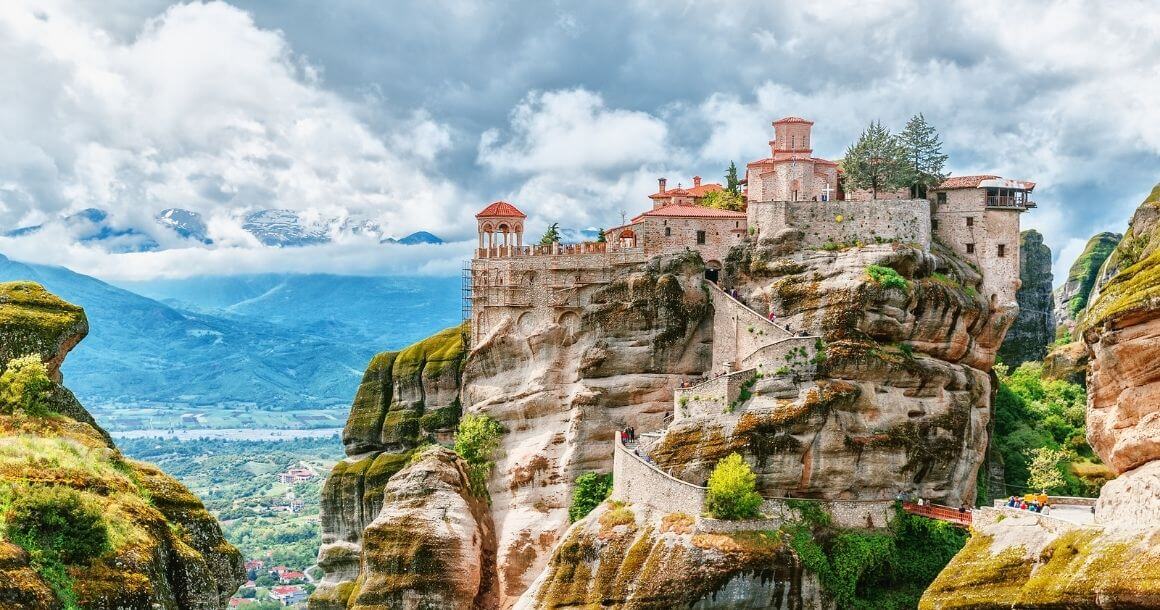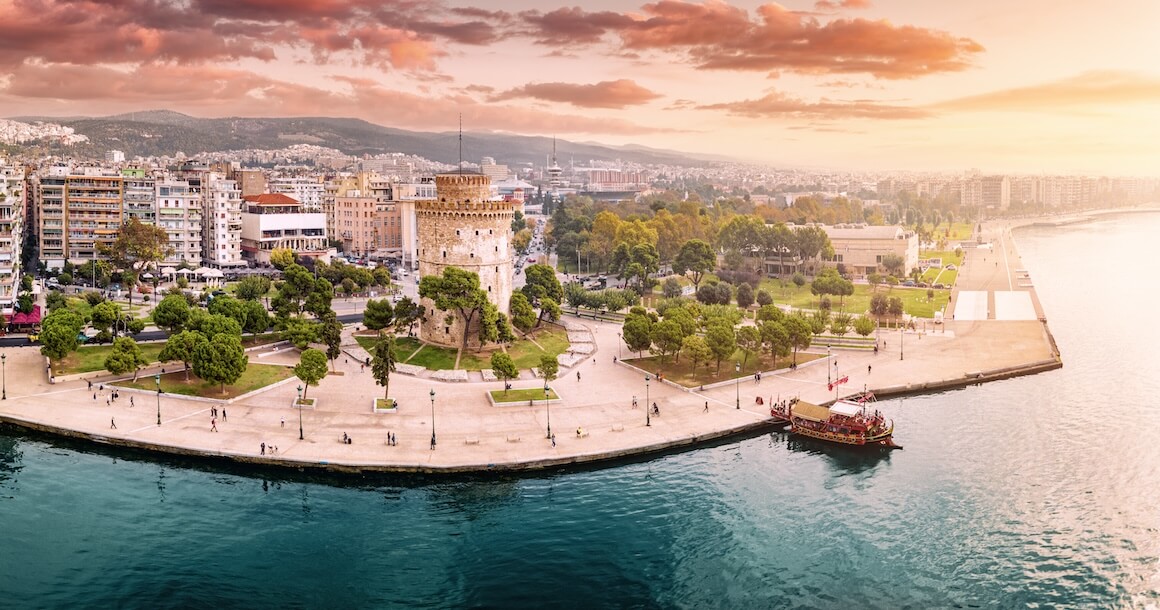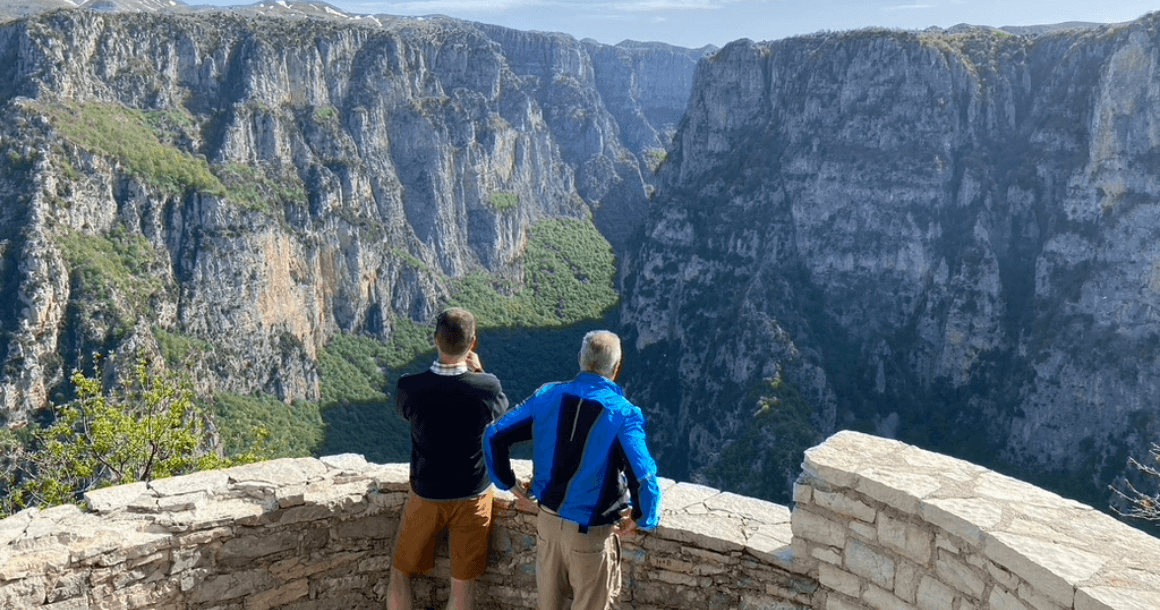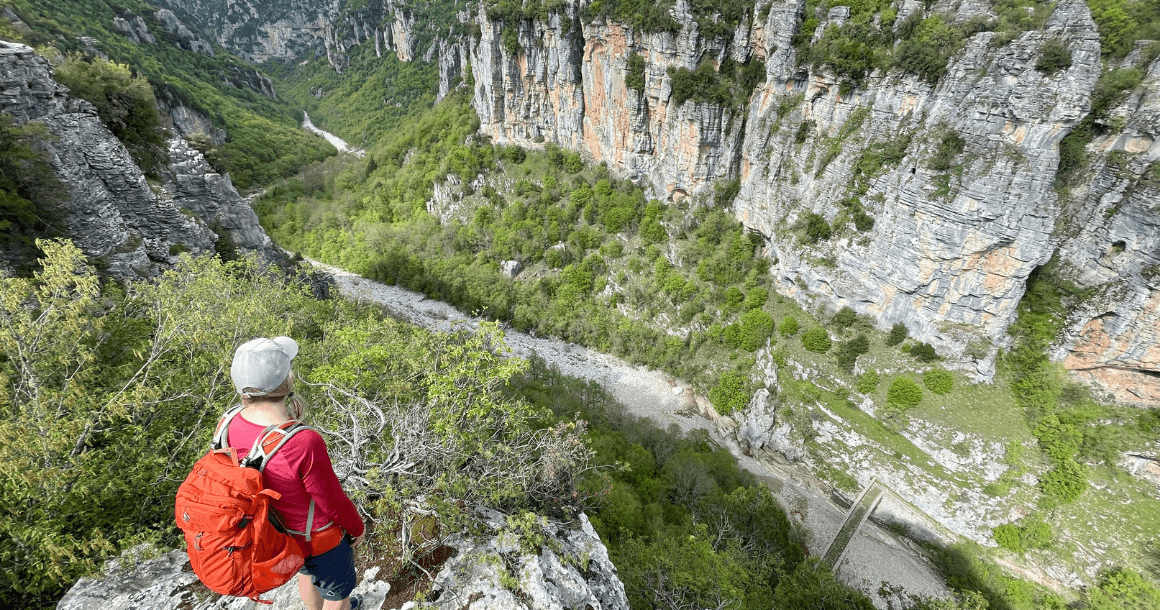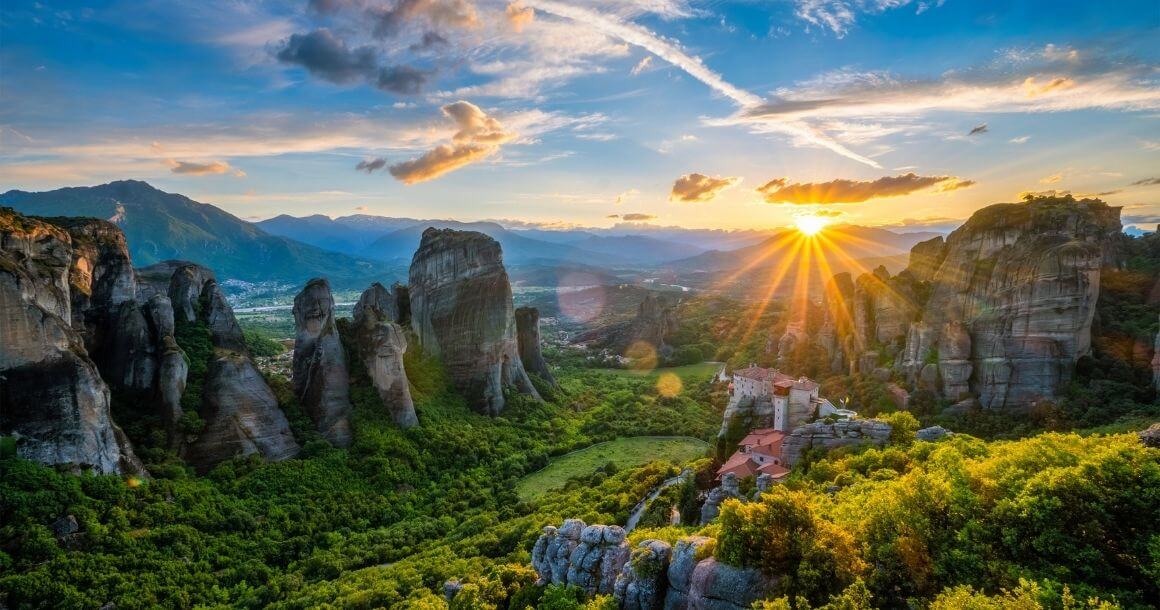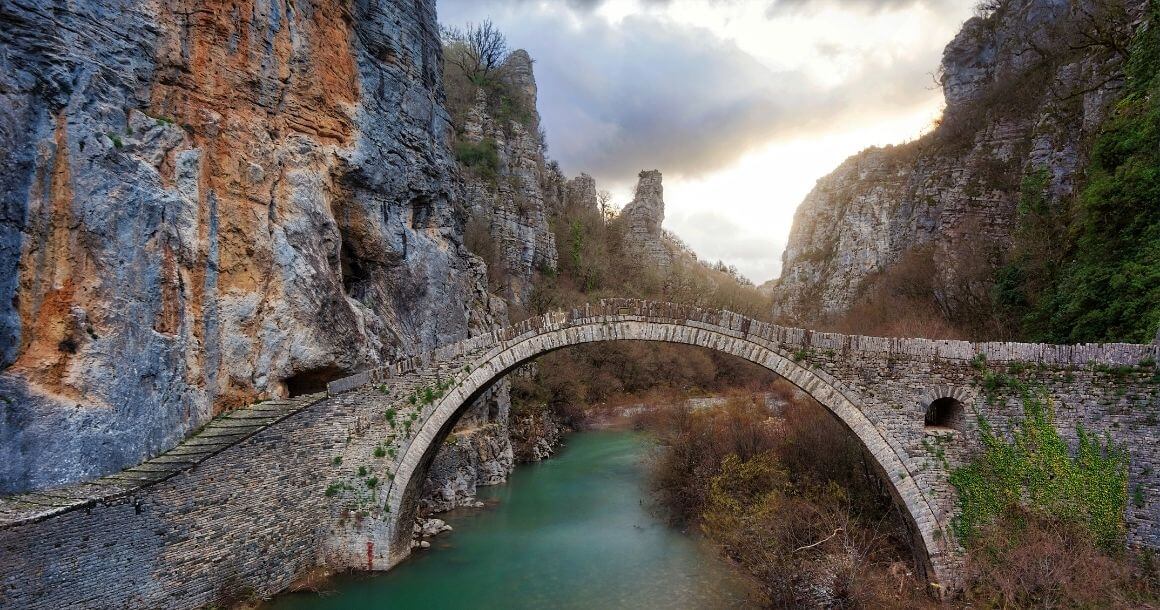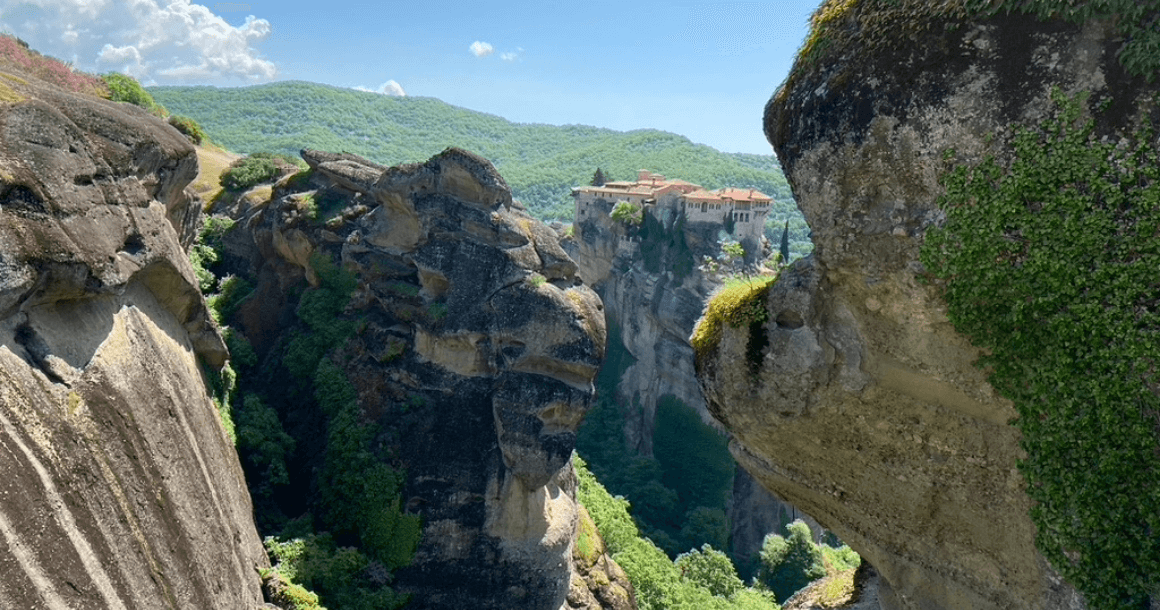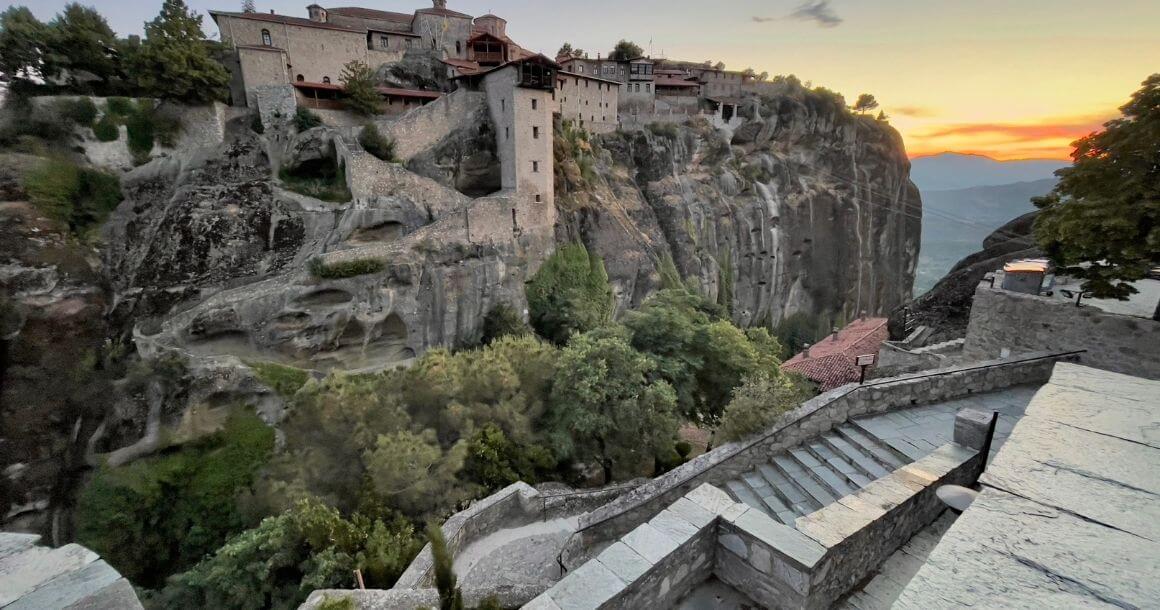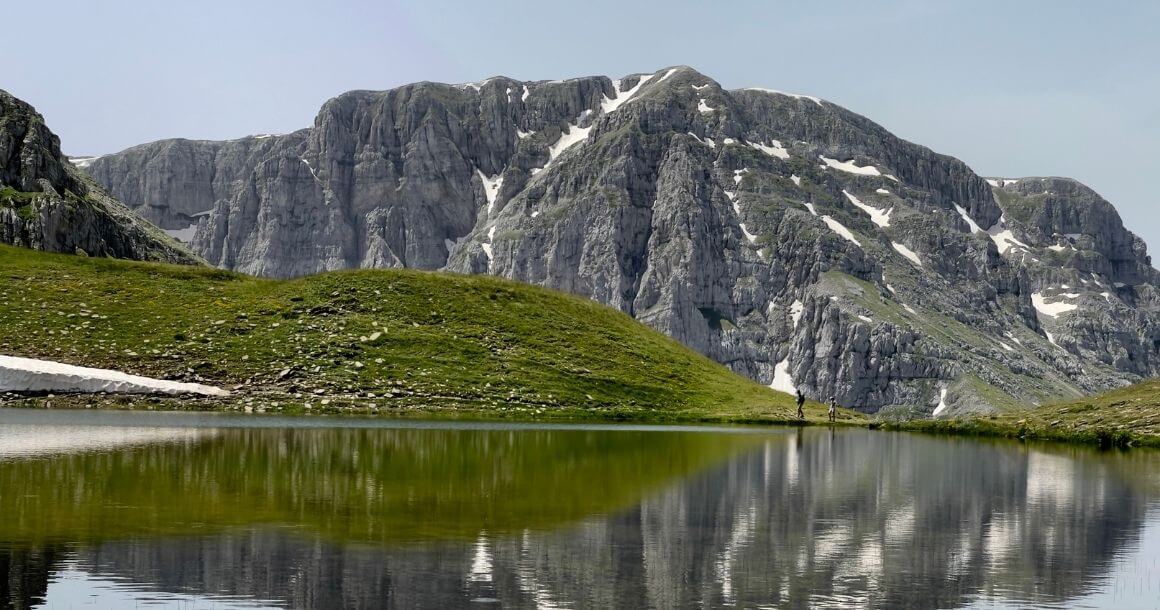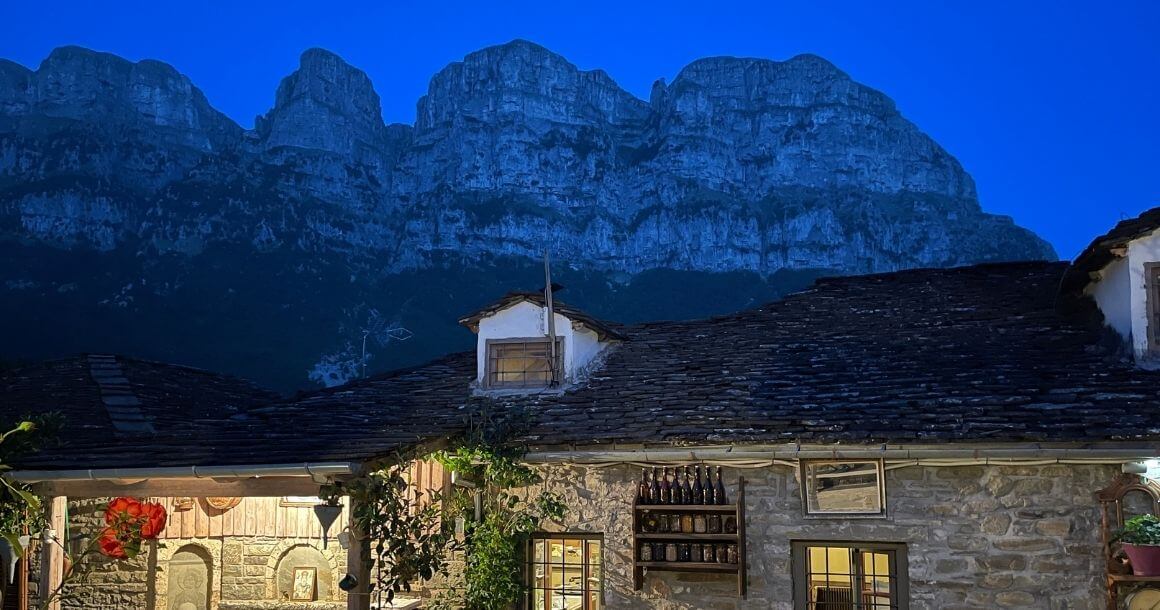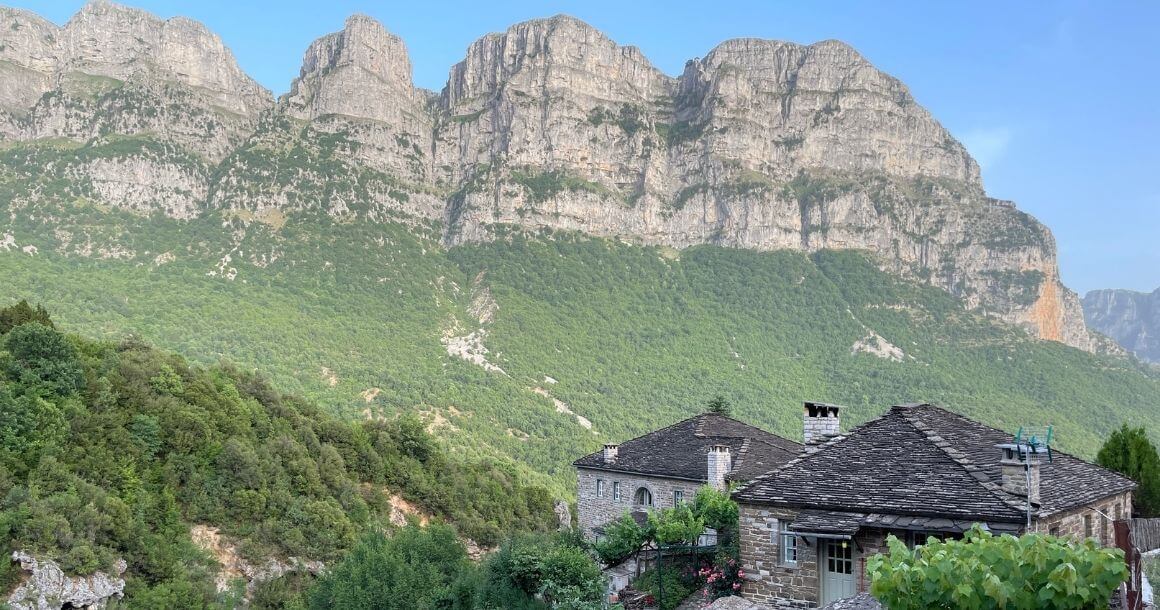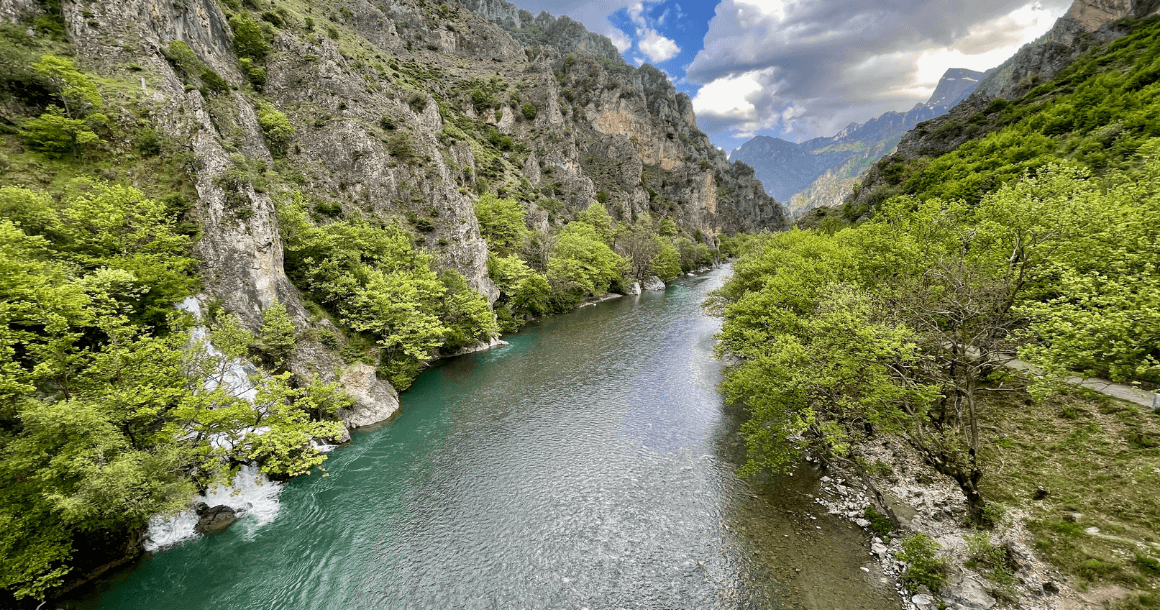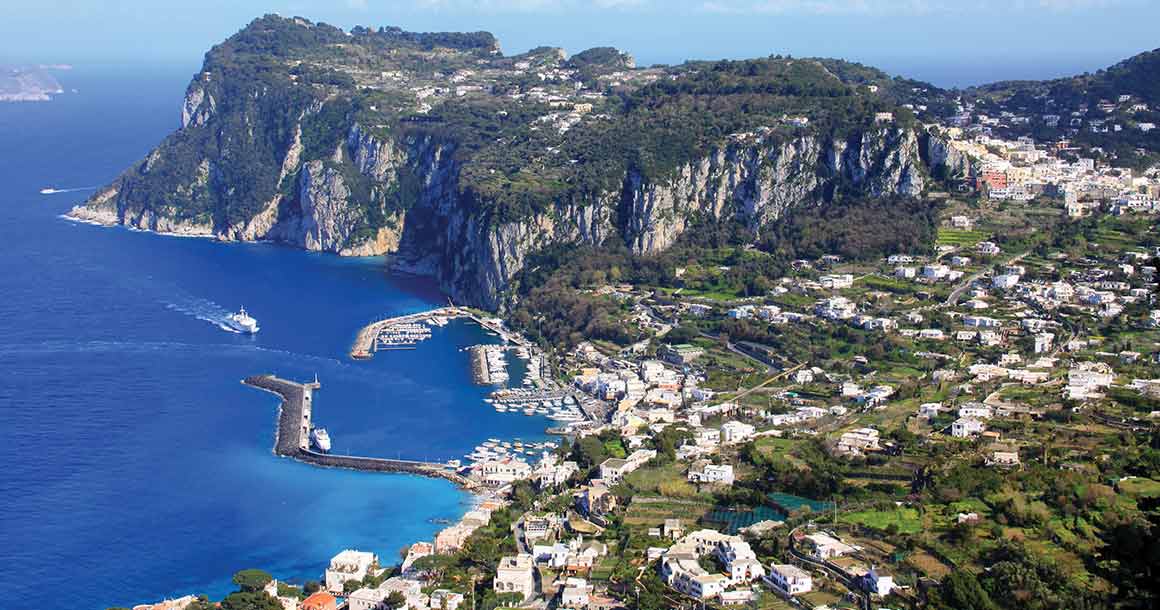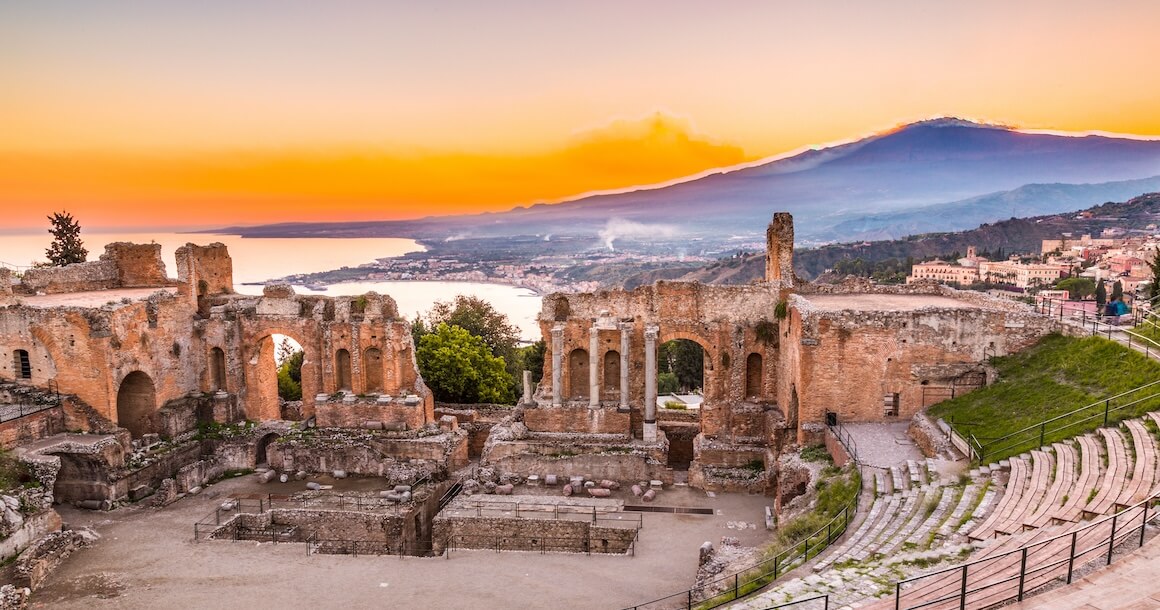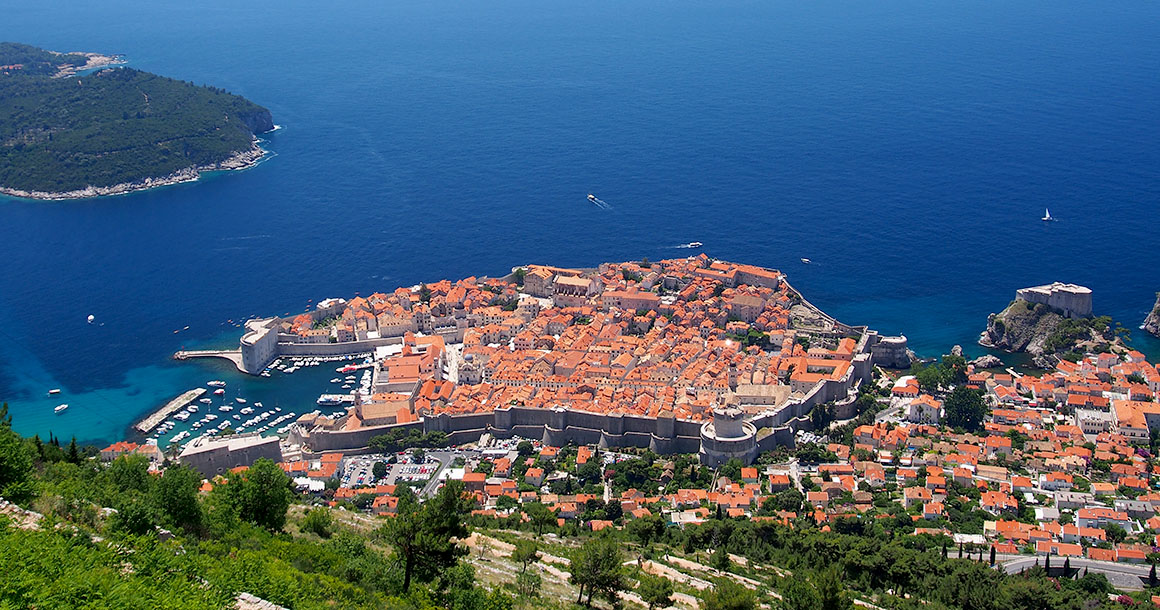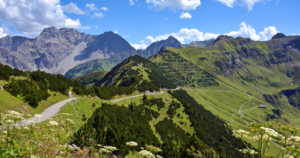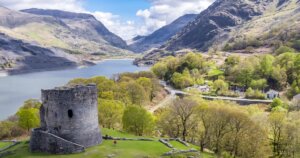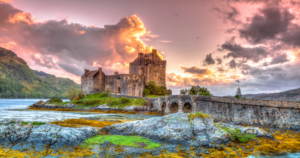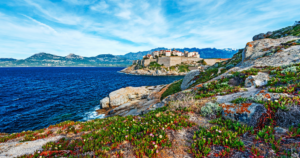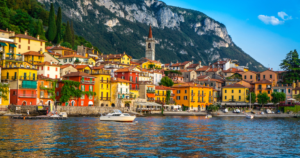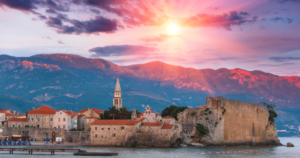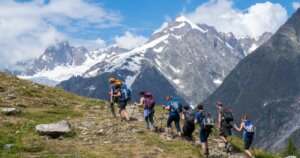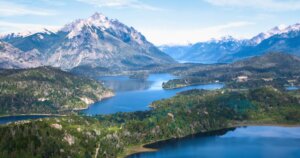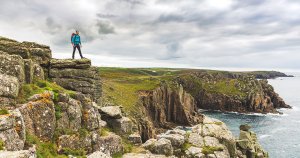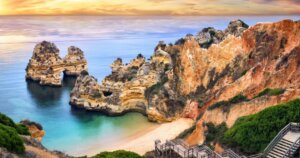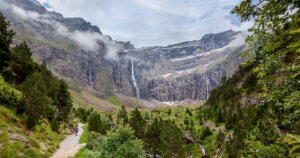Northern Greece | Aegean Sea and Epirus Mountains
Explore 12th-Century monasteries, hike under the Astraka Towers in Pindus National Park and discover Vikos Gorge—the Grand Canyon of Greece.

Trip Highlights:
-
Explore the Zagori region of the Epirus Mountains which are dotted with Byzantine, Ottoman, and Medieval ruins.
-
Discover a country full of ancient history, lively modern Greek culture, and a network of captivating wilderness trails.
-
Travel to the UNESCO world heritage site of Meteora and hike in the Pindus National Park, above the alpine town of Metsovo.
-
Overnight in deluxe hotels in charming towns and experience a delightful fusion of Mediterranean and Eastern European cuisines.
The rolling crags of the Zagori region of the Epirus Mountains are dotted with Byzantine, Ottoman, and Medieval ruins. Lush foliage obscures ancient roads and gorgeous arched bridges built in the early 1800s, while dolomite spires rise above the canopy. The Epirus Mountains run towards the Aegean Sea from Western Macedonia. The wilds of Northern Greece are the perfect place for your next escape into nature. They are full of ancient history, lively modern Greek culture, and a network of captivating wilderness trails.
Ryder-Walker’s Northern Greece Trek takes you through pastoral beauty and preserved historic cities to explore Greece’s Epirus Mountains. The tour begins at the port city of Thessaloniki. Named for Alexander the Great’s sister, Thessaloniki overlooks the cool blue waters of the Aegean Sea where Odysseus once wandered in Homer’s epic. From Thessaloniki, we travel to the UNESCO World Heritage site of Meteora, where red-roofed monasteries sit atop limestone towers, and the landscape looks like something straight from the pages of a fantasy novel. Sweeping views of the Northern Pindus Mountain range open up as we trek deep into the historic region. Finally, we end the tour in the city of Ioánnina, a painted city that was the heart of the Ancient Greek’s exploration into astronomy and flourished under Ottoman occupation, with the Ottoman influence on the city’s architecture still visible today.
The history of the Epirus mountains is a rich tapestry of the confluence of eastern and European civilizations. The region was settled in the Paleolithic period, and would become a cultural hub when the exceptional works of the local stonemasons were discovered. To this day the region is an architectural marvel, with the modern constructions influenced by both the Byzantine and Ottoman styles. During the Byzantine Period, the region’s capital at the time, Thessaloniki rose to a majesty that was rivaled only by Constantinople. After the turmoil of the Medieval Period, the Ottomans sacked and occupied the city between 1430 and 1890 AD. During this time the city became a center for both science and art, referred to at times as the Greek Enlightenment. While the Northern Pindus Range remained isolated from the military and cultural movements of the cities below, the area’s famous stonemasons and dedicated shepherds would build a series of iconic villages, and the region’s 12th-century monasteries add a unique majesty to the wilderness.
We begin our itinerary with a guided tour of Thessaloniki. We then travel to the UNESCO world heritage site of Meteora, hike in the Pindus National Park above the alpine town of Metsovo, and visit the Katogi Averoff Winery.
Heading west, we travel along the deep alpine valley until we reach Zagori where we hike in the Vikos Gorge, a remarkable canyon that is the deepest in the world relative to its surprisingly narrow width. Our trip into the Vikos Gorge truly invites a sense of traveling into the center of the earth.
Continuing on, we hike to the Astraka Mountain Hut, with sweeping views of the looming Astraka Towers. Afterwards, we explore the Pápigo village of Mikró and spend another night in this magical village.
On our way back to Thessaloniki we stop at the lake town of Ioánnina, the cultural and economical capital of the Epirus region. Afterwards, we proceed to the magical archaeological site of Vergina, set in the vast peach fields on the foot of Mount Olympus. We take a tour of this UNESCO World Heritage Site, known for the discovery of the Royal Tombs where the father of Alexander the Great, King Philip II of Macedon, was laid to rest.
Throughout the trip we overnight in deluxe hotels and charming inns and experience a delightful fusion of Mediterranean and Eastern European cuisines. Enjoy light and fresh foods such as seafood and Greek salads, or more hearty options such as goulashes, lamb and cheese-filled pastries.
Trip Itinerary
Arrive independently to Thessaloniki, co-capital of Greece and the second largest city in the country. You will be delighted by this vibrant port town located on the Aegean Sea and known for its delicious cuisine. The captivating architecture is a combination of ancient, classical, chaotic and modern. Meet the group and guide(s) for welcome drinks at the hotel followed by dinner at 7:00 p.m.
Thessaloniki Airport is only 30 minutes from the city center and offers multiple daily connections to all major European gateways.
Today we explore Thessaloniki with a local guide who will take us on a tour of the most important city monuments—also a great introduction to the history of the country and a chance to learn more about recent events of the economical crises.
After the city tour we embark on a 2.5-hour drive along the coast and under Mount Olympus. Our destination is the picturesque village of Kastraki located at the foot of the Meteora complexes. (Meteora means “suspended in air.”)
Distance: 4 miles. Elevation gain/loss: 500 ft.
Today’s hike begins on the ancient footpaths among the mysterious and uniquely shaped mighty pillars of Meteora. We visit one of the cliff hanging monasteries—a place of pilgrimage and orthodox spiritual life for the past 10 centuries. In the afternoon, we depart on a 1.25 hour transfer to the alpine town of Metsovo.
Distance: 6 miles. Elevation gain/loss: 1500 ft.
Metsovo is Greece’s only true mountain town. Its architecture and culture is of Ottoman and Albanian heritage. It is a favorite of locals due to its unique location above the wild, precipitous valley that separates north from south along the Pindus Mountain range.
Our scenic hike starts from a high plateau above the town, crossing over pastures and wandering through the forest up to a local summit for spectacular views of the snowy mountain peaks of North Pindus. We follow the rim of the forest on a newly built Ursu (bear) trail, also the local trail running marathon course. Before we make our way back into the townwe make a stop at the Katogi Averoff museum and winery, one of Greece’s most celebrated local vineyards, known for the successful blends of indigenous Greek grape with foreign varieties. Overnight in Metsovo.
Distance: 7 miles. Elevation gain/loss: 2000 ft.
Following a scenic drive, we arrive to the remote, mountainous region of Zagori, home of the UNESCO- protected Vikos Gorge, known to be the deepest canyon in the world. Zagori is comprised of 46 thousand-year-old hamlets and villages.
Today’s gentle “Seven Bridges Hike” hike starts in the village of Dilofo, and has us following old stone footpaths and crossing arching stone bridges above mountain streams and rivers connecting to the tranquil villages of Kipi, Koukouli and Vitsa. We overnight in Vista.
Distance: 7 miles. Elevation gain/loss: 1800 ft.
After breakfast and short scenic drive we hike up to the remote, picturesque village of Varadeto, the highest of the Zagori villages at 4500 feet. In a 1000 ft ascent, the staircase of Varadeto connects two villages through a series of narrow switchbacks. This is a true architectural masterpiece and one of the oldest cobblestone staircases to be found in Epirus. Our hike continues through upper grasslands and pastures to the viewpoint of Beloi, revealing stunning views of the nearly 3000 feet of vertical cliffs above the Vikos Gorge. A longer version of this hike starts in the atmospheric village of Tsepelovo and follows the trail crossing the rugged mountain plateau of Mt. Timfi before descending down to Varadeto. Spend a second night in Vitsa.
Distance: 5–10 miles. Elevation gain/loss: 1500– 3000 ft.
The gorge of Vikos, with its 3000-ft. sharp limestone cliffs, is one of the most impressive landforms in Europe. Walking around the village of Monodendri, we find numerous excellent viewpoints where we explore the abyss and admire the spectacular gorge. Our truly unique experience begins with a descent into the depths of the gorge on a spiral staircase.
After reaching the riverbed, we follow the stream for several hours to where it joins the cold springs of the Voïdomátis River. A steep climb brings us to the hamlet of Vikos for awe-inspiring 360-degree views. The day ends with a quick transfer to a boutique hotel in the tiny village of Mikró Pápigo.
Distance: 9 miles. Elevation gain/loss: 1500 ft.
Today we explore the tranquil surrounding of the Pápigo villages with both shorter and longer hike options available. For a longer day we head up to the mountain hut, set on the shoulder of the Astraka towers. After a rest we descend the back valley to Dragon Lake. For a more modest route we hike to the viewpoint and return to tour around the Papigo villages and a possible swim in the local natural pools carved by the nearby alpine river. Enjoy a second night in Pápigo.
Distance: 5 to 10 miles. Elevation gain/loss: 1000 to 3500 ft.
Our adventure today begins by transferring back towards Thessaloniki. We stop for a lunch in the vibrant lake town of Ioánnina, the cultural and economic capitol of Epirus, favored by Greek and European poets, literates, and artists. Continuing on, we stop for a tour at the magical archaeological site of Vergina, set in the vast peach fields on the foot of Mount Olympus. This historic site is known for the discovery of the Royal Tombs where the father of Alexander the Great, King Philip II of Macedon, was laid to rest. It is also a UNESCO World Heritage Site.
In the late afternoon we drive to Thessaloniki and celebrate our tours end with a final dinner at our beautiful sea side hotel.
Depart.

